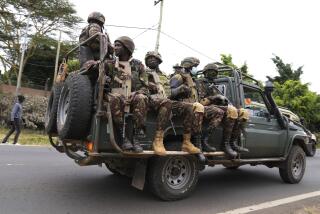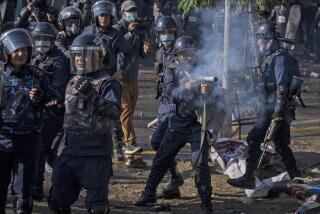Protesters, troops clash for third day in Egypt
- Share via
Reporting from Beirut and Cairo — Protesters demanding the end of military rule and Egyptian troops hurled rocks at each other in the center of Cairo on Sunday in the third day of clashes that have killed at least 10 people and injured hundreds.
The violence has exposed sharp divisions among Egyptians about the military council that has ruled since President Hosni Mubarak was overthrown Feb. 11 in a popular uprising that helped inspire revolts against autocratic rulers across the Arab world.
Anger has been building among young activists over the generals’ failure to deliver promised reforms and their refusal to cede power to a civilian administration until the middle of next year. But many Egyptians are tired of the economic disruption caused by months of unrest, and the number of demonstrators in the streets has remained relatively small compared with previous protests.
The latest skirmishes began after the second stage of voting last week for a new parliament, which many see as a path to stability and civilian rule. Voter turnout Wednesday and Thursday was 67%, electoral officials said, even higher than in November, when 52% of eligible voters cast ballots. A third and final round is scheduled in January with presidential elections promised by July.
“I think the large number who participated in the voting sent a very powerful message that they would like the country to return to a state of normalcy,” said Mustapha Kamel Sayyid, a political science professor at Cairo University and the American University in Cairo.
The Muslim Brotherhood, the Islamist movement whose political party won the largest share of votes in the first round last month, has criticized the military’s response to protesters but has not sent its supporters into the streets, suggesting it is unwilling to risk its gains at the polls.
Sunday’s unrest was largely confined to roads near Tahrir Square, which was the epicenter of the protests that toppled Mubarak. The two sides faced off across a concrete barrier erected by security forces in Sheik Rehan Street to prevent the crowd from reaching the parliament and Cabinet buildings, where the clashes began early Friday after a demonstrator was arrested and beaten.
Rocks and debris littered the street, where a building housing historic archives was torched at the height of the fighting Saturday. The military and protesters traded accusations of who was to blame.
Prime Minister Kamal Ganzouri had said that troops weren’t using live ammunition. But the Ministry of Health said six of the 10 people killed had died of gunshot wounds. By late Sunday, the number of wounded stood at about 500.
Video and photographs of military police beating protesters to the ground with sticks Saturday sent shock waves through a nation more used to seeing such brutality from the civilian police. An image of troops pulling up the shirt of a woman in a religious head scarf as another soldier raised a foot to stomp her midriff caused particular outrage on social media sites and in some independent newspapers.
“I wasn’t taking part in this protest, but I was enraged by the scenes and photos of people beaten and stripped of their clothes,” said Ahmed Ibrahim, a handyman who was limping Sunday on a bandaged left leg. “I decided to come and see what’s going on and got beaten by an army officer.... Is this the army that once claimed it was protecting us? Now they are even worse than the police under Mubarak.”
The sentiment is in sharp contrast with February when the military was credited with intervening to help end Mubarak’s three decades of rule and at times was celebrated by the protesters in Tahrir Square.
“Protests brought us some rights and they remain the only way of fulfilling the rest of the revolution’s demands,” said Gharieb Saad, a young engineer who was among the demonstrators Sunday. “I can’t stay at home and say let’s build an economy while the rulers don’t want to build a new, fair and just country.”
The military has portrayed itself as protecting the nation against vandals and thugs, a message that has resonated with neighborhood residents and shopkeepers, some of whom attacked protesters during the weekend melees.
Khaled Hassan, who owns a clothing store near Tahrir Square, said the continued unrest was destroying his business.
“The country will collapse if we keep going like this,” Hassan said. “We can’t live and work anymore. Everyday there is a catastrophe and protesters don’t want to stop.”
Times staff writer Zavis reported from Beirut and news assistant Hassan from Cairo.
More to Read
Sign up for Essential California
The most important California stories and recommendations in your inbox every morning.
You may occasionally receive promotional content from the Los Angeles Times.










